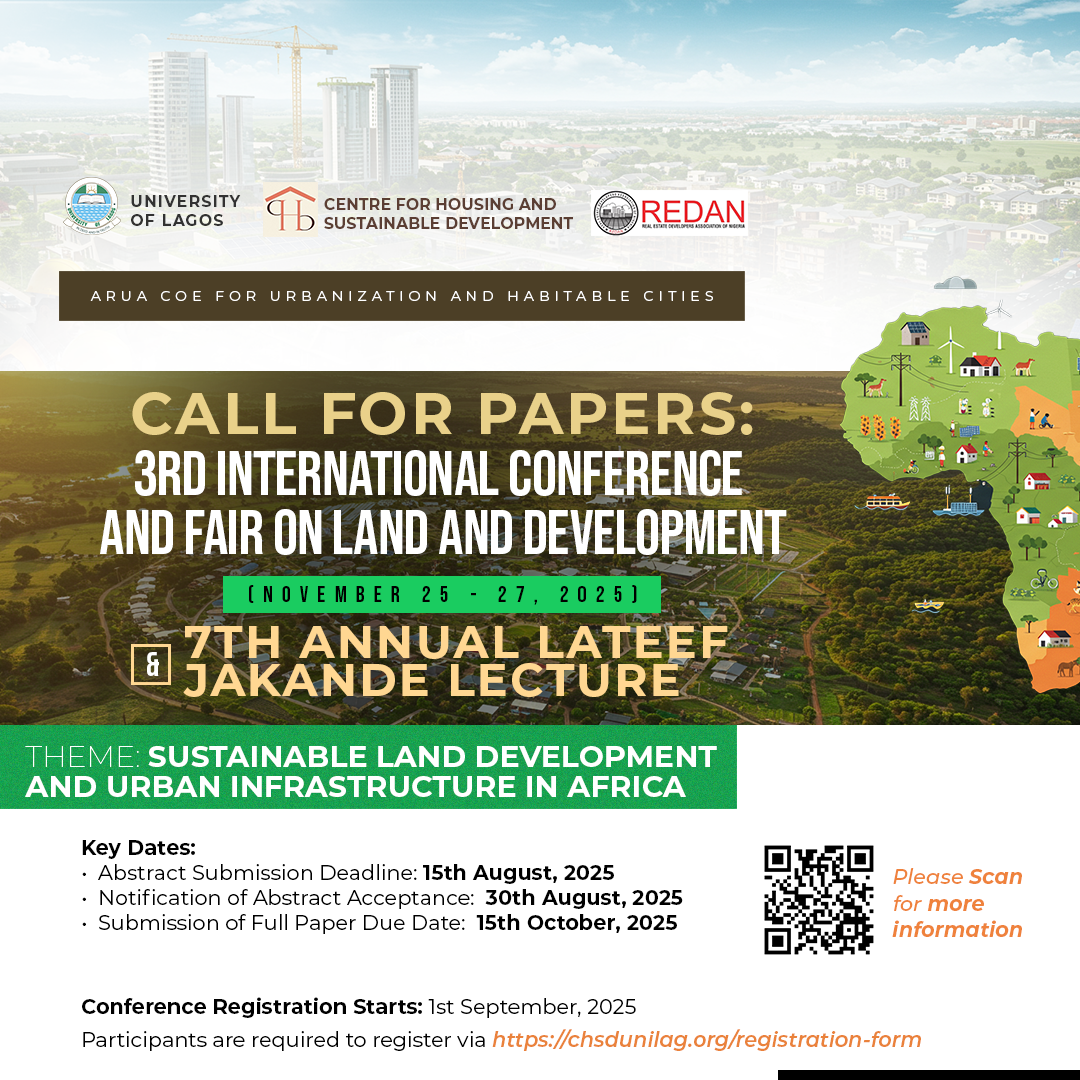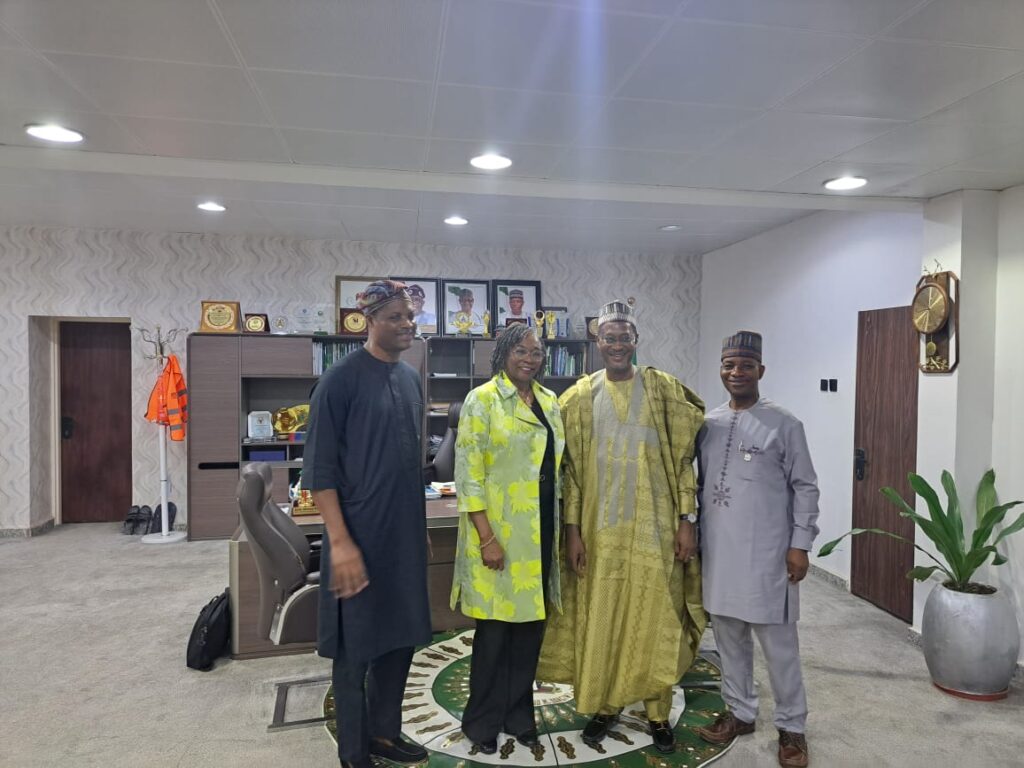CALL FOR PAPERS: 3RD INTERNATIONAL CONFERENCE AND FAIR ON LAND AND DEVELOPMENT
CALL FOR PAPERS: 3RD INTERNATIONAL CONFERENCE AND FAIR ON LAND AND DEVELOPMENT (NOVEMBER 25 – 27, 2025)
Theme: Sustainable Land Development and Urban Infrastructure in Africa
Introduction
The 2nd International Conference & Fair on Land Development, held last year, brought together a diverse group of stakeholders: land administrators, financial institutions, judiciary members, researchers, and practitioners from across Africa. Under the theme ‘Sustainable Land Management for Inclusive Development in African Cities’, the event fostered critical discussions on reforming the outdated 1978 Land Use Act. Highlights included insightful keynote and papers addressing land affordability, accessibility, and urban planning strategies. The conference concluded with concrete recommendations and strengthened partnerships aimed at tackling land governance challenges across the continent.
Following the resounding success and insightful recommendations from last year, this year’s conference, “Sustainable Land Development and Urban Infrastructure in Africa”, builds upon the momentum to deepen the discourse on sustainable urban transformation. As African cities continue to experience rapid urban growth, they face both immense opportunities and complex challenges. While urban expansion offers prospects for economic development, innovation, and an improved quality of life, it also brings pressing concerns around equitable land use, infrastructure deficits, and environmental sustainability.
Sustainable land development is vital for balancing human settlement needs with environmental preservation and economic growth. In Africa, the challenges are compounded by issues such as informal settlements, land tenure insecurity, environmental degradation, and inadequate planning frameworks. Yet, these challenges also open pathways for rethinking and redesigning urban spaces to be smarter, greener, and more equitable. Similarly, robust urban infrastructure spanning transportation, energy, water supply, sanitation, and digital connectivity is essential for supporting thriving cities and rural-urban integration. In many economies, infrastructure growth has been hampered by limited investment. While it is a top priority for many government administrations, the government is limited in its capacity to fund these projects. With the pressure to fulfil their fundamental roles, especially toward achieving the 2030 Agenda for sustainable development, cities and local urban stakeholders are looking at alternative and sustainable financing for the various urban regeneration projects (Weber, 2010).
The global need for urban infrastructure investment is $4.5 trillion annually, with a 9 to 27% premium required to make this infrastructure low-emissions and climate-resilient (CCFLA 2015). The emerging world’s cities account for a large portion of this demand – with about $1.3 trillion required. African cities alone are facing a growing infrastructure gap estimated to reach US$68 billion annually by 2040 (World Bank, 2020). Much more is that substantially more resources than exist among the governments and all multilateral development finance organizations combined will be required. Therefore, African cities must explore various financing options to bridge this gap. The World Bank reports that the necessary funding is available as the private institutional capital accounts for $106 trillion from governmental, private, and philanthropic sources worldwide. However, only 1.6% of the money is invested in infrastructure, which is insufficient to make it more resilient (World Bank, 2015). One effective avenue involves nurturing increased collaboration between the private and public sectors; therefore, the private sector has a significant need and opportunity to invest in city resilience worldwide.
Sustainable land development and the financing future of infrastructure in African cities are a complex issue that requires a comprehensive approach. Therefore, this conference seeks to bring together stakeholders across academia, government, industry, and civil society by providing a platform to explore innovative solutions and strategies for achieving sustainable land use and the creation of resilient, inclusive, and efficient urban infrastructure to support Africa’s growing urban populations. However, interactions with stakeholders from other parts of the world are welcome to share impactful knowledge and practices.
Aim
To foster multidisciplinary dialogue and collaborative action toward sustainable land development and urban infrastructure that meets the social, economic, and environmental needs of Africa’s growing urban populations.
Objectives
- To examine current trends, challenges, and opportunities in land development and urban infrastructure across African cities and regions.
- To showcase innovative research, technologies, and practices that promote sustainability, resilience, and inclusivity in urban planning and infrastructure design.
- To facilitate knowledge exchange between policymakers, academics, practitioners, and community leaders.
- To propose actionable policies and strategies for sustainable urban land use, efficient infrastructure provision, and climate-resilient development.
- To encourage investment and capacity building in planning, construction, and governance frameworks that support long-term urban sustainability.
Sub-Themes:
The following sub-themes are proposed for the conference and abstracts submissions covering these areas are welcomed for submission.
- Urban Planning and Smart Growth in African Cities
- Strategies for addressing urban expansion, sprawl and peri-urban land management
- Informality and urban services
- Integrating smart technologies into urban planning
- Participatory and inclusive urban governance
- Land Use Policy, Legislation, Tenure, and Management
- Legal frameworks for land ownership and access
- Legal frameworks for land administration and management
- Land use conflicts and resolution mechanisms
- Innovations in land administration systems
- Climate Resilience and Environmental Sustainability
- Green infrastructure and nature-based solutions
- Urban responses to climate change and disaster risk
- Sustainable building materials and construction practices
- Land remediation practices
- Sustainable urban drainage infrastructure
- Infrastructure for Inclusive Growth
- Transportation networks and mobility planning
- Water, sanitation, and waste management systems
- Affordable housing and energy infrastructure
- Financing and Public-Private Partnerships (PPPs)
- Innovative financing models for infrastructure development
- The role of private sector and international development partners
- Risk mitigation and investment security
- Digital Infrastructure and the Future of African Cities
- Smart city frameworks and digital inclusion
- ICT infrastructure and urban data management
- Leveraging AI and GIS in land management and urban development
- Housing and Real Estate Development
- Neighbourhood-level design and development
- Sustainable urban regeneration
- Housing markets and property-led growth
- Housing, health care and healthy places
- Urban Development Research Futures
- Transdisciplinarity and Urban Futures
- Capacity Building and Institutional Strengthening
- Education and training for sustainable urban development
- Enhancing institutional coordination and governance
- Bridging research-policy gaps
The outcomes of this international conference will contribute to the development of a comprehensive and inclusive approach to land management, development and Urban Infrastructure in Africa, ultimately supporting the region’s sustainable growth and the well-being of its residents.
Guideline for Abstract Submission:
- Title of Paper
- Authors with their affiliations and contact emails (Other names first, and then surname in the capital)
- Indicate the corresponding author
- Abstract should not be more than 350 words with five (5) keywords
- Required font type/size is Time New Romans/12
Abstract should be submitted to the team by filling the form on: https://forms.gle/aKkDFWkep6BQUntm8 or scan

Key Dates:
- Abstract Submission Deadline: 15th August, 2025
- Notification of Abstract Acceptance: 30th August, 2025
- Submission of Full Paper Due Date: 15th October, 2025
* Abstracts and full papers will be subject to double-blind peer review processes, and quality submitted papers will be published in the Centre’s Journal – “The African Journal of Housing and Sustainable Development” Annual Issue.
Conference Registration Starts: 1st September, 2025
Participants are required to register on the website @ https://chsdunilag.org/registration-form
Further enquiries about the conference and sponsorship can be sent to landevconchsd@gmail.com.


